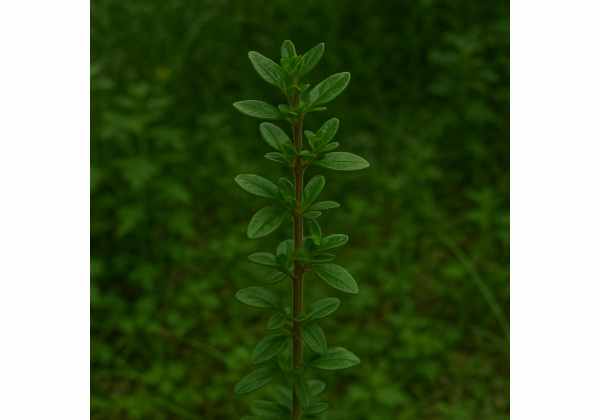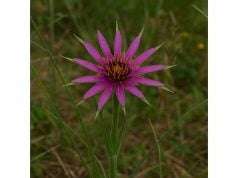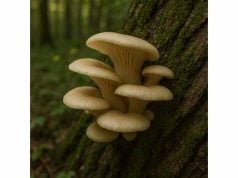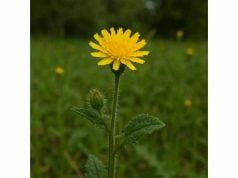
Orange Thyme is a unique variety of thyme that distinguishes itself with warm, citrus-inflected notes and a vibrant orange hue in its blooms. This aromatic herb is celebrated for its diverse range of health benefits, driven by its potent essential oils and bioactive compounds such as thymol, carvacrol, and rosmarinic acid. Widely used in culinary, medicinal, and cosmetic applications, Orange Thyme supports respiratory health, boosts digestion, and provides antioxidant protection. Traditionally valued in herbal medicine, its uses span from soothing teas and tinctures to topical formulations. In this comprehensive article, we delve into its botanical profile, chemical composition, therapeutic advantages, practical applications, and scientific research.
Table of Contents
- Plant Profile and Identification
- Phytochemistry and Active Compounds
- Health Benefits and Essential Qualities
- Practical Applications and Safety Protocols
- Research Insights and Key Findings
- FAQ
Plant Profile and Identification
Orange Thyme belongs to the Lamiaceae family, a group renowned for its aromatic and medicinal herbs. Botanically related to common thyme (Thymus vulgaris), Orange Thyme is distinguished by its striking orange-hued blossoms and subtly variegated foliage that carries hints of golden tones. This perennial herb features small, oval leaves with serrated edges, and its delicate, tubular flowers are arranged in dense clusters that emit a refreshing, citrus-like aroma.
Taxonomy and Botanical Classification
Orange Thyme is classified under the genus Thymus, and while its exact botanical designation may vary among cultivars, it is often regarded as a specialty type within thyme species. Its taxonomy emphasizes not only its culinary significance but also its ethnobotanical importance. Historically, various cultures have used thyme for its preservative and healing properties; Orange Thyme, with its unique coloration and enhanced aromatic profile, is now recognized for its expanded health benefits.
Morphological Features and Growth Characteristics
The morphology of Orange Thyme is notable for its compact growth habit. The plant typically forms a low, spreading mat that can serve as an attractive ground cover in herb gardens. Its leaves, which are usually small and densely packed along the stems, provide an appealing contrast to the vibrant orange or amber flowers that bloom in late spring and early summer. The plant’s overall structure is both ornamental and practical, as it thrives in well-drained soils and sunny locations, making it a favorite for rock gardens and Mediterranean-style landscapes.
Key identification markers include:
- Leaf Structure: Small, oval, and slightly fuzzy leaves with serrated margins.
- Flower Arrangement: Clusters of tubular flowers with a distinct orange or amber coloration.
- Growth Habit: Low-spreading, forming dense mats that are drought-resistant.
- Aroma: A refreshing citrus-mint fragrance that intensifies when the leaves are bruised.
Natural Habitat and Cultivation Requirements
Native to Mediterranean regions, Orange Thyme flourishes in environments characterized by hot, dry summers and mild, wet winters. Its adaptation to rocky, well-drained soils makes it an excellent candidate for xeriscaping and organic gardening. Gardeners appreciate its resilience and low maintenance, as Orange Thyme is highly drought-tolerant and resistant to common pests. When cultivating this herb, it is recommended to plant it in areas with full sun exposure and minimal soil disturbance to encourage robust growth and an abundant flowering display.
Historical and Ethnobotanical Context
Throughout history, thyme has been revered for its medicinal and culinary applications. In ancient times, it was associated with courage and purification, often used in religious rituals and as a natural preservative. Orange Thyme, with its distinctive hue and flavor profile, builds upon this legacy by offering enhanced therapeutic benefits. Traditional herbalists have long utilized its extracts to treat respiratory ailments, digestive issues, and even skin conditions. Its continued use in modern herbal medicine is a testament to its enduring efficacy and cultural significance.
Ecological and Environmental Benefits
Beyond its medicinal and culinary applications, Orange Thyme plays an important role in local ecosystems. Its flowers attract a variety of pollinators, including bees, butterflies, and hummingbirds, thereby contributing to biodiversity. Moreover, its low-growing nature and extensive root system help in soil stabilization and erosion control, making it an environmentally friendly choice for sustainable landscaping. By incorporating Orange Thyme into gardens and natural habitats, one not only enjoys its aromatic beauty but also supports ecological balance and conservation efforts.
In summary, the botanical profile and identification of Orange Thyme reveal a herb that is both visually striking and functionally robust. Its unique combination of ornamental appeal, adaptability, and historical significance makes it a cherished component of both culinary and medicinal traditions. Gardeners, herbalists, and researchers alike continue to explore its many virtues, ensuring that Orange Thyme remains a valued natural resource for generations to come.
Phytochemistry and Active Compounds
The medicinal power of Orange Thyme lies in its complex phytochemical composition. Through modern analytical techniques, scientists have identified several key compounds that contribute to its therapeutic properties. Each component plays a specific role in promoting health, from antioxidant protection to anti-inflammatory effects.
- Thymol
Thymol is a potent monoterpene phenol found in high concentrations in Orange Thyme. It is renowned for its antimicrobial and antiseptic properties, making it effective against a range of pathogens. Thymol’s ability to disrupt bacterial cell membranes is particularly beneficial in treating respiratory and skin infections. - Carvacrol
Closely related to thymol, carvacrol is another monoterpenoid that exhibits strong antimicrobial and antifungal activities. Its presence enhances the overall efficacy of Orange Thyme in fighting infections and supporting the immune system. Carvacrol also contributes to the herb’s distinctive aroma and flavor profile. - Rosmarinic Acid
A powerful antioxidant, rosmarinic acid helps neutralize free radicals and protect cells from oxidative stress. Its anti-inflammatory properties are instrumental in reducing symptoms of chronic inflammation and supporting cardiovascular health. Rosmarinic acid is also known to have neuroprotective effects, which may contribute to improved cognitive function. - Flavonoids (e.g., Luteolin, Apigenin, and Eriocitrin)
Flavonoids are a diverse group of phytonutrients that provide a broad spectrum of health benefits. In Orange Thyme, flavonoids such as luteolin and apigenin help reduce inflammation, protect against oxidative stress, and support vascular health. Eriocitrin, another flavonoid present in this herb, contributes to its overall antioxidant capacity and aids in maintaining skin health. - Essential Oils
The essential oil fraction of Orange Thyme is a complex blend of volatile compounds responsible for its characteristic scent. These oils, which include minor components like p-cymene and γ-terpinene, exhibit antimicrobial, anti-inflammatory, and analgesic properties. Their rapid absorption through the skin and respiratory tract makes them effective in aromatherapy and topical treatments. - Phenolic Acids (Other than Rosmarinic Acid)
In addition to rosmarinic acid, Orange Thyme contains other phenolic acids that bolster its antioxidant defenses. These compounds help protect DNA from oxidative damage and support cellular repair mechanisms, contributing to the herb’s anti-aging and disease-preventive properties. - Triterpenoids
Although present in smaller amounts, triterpenoids in Orange Thyme play a role in modulating immune responses and reducing inflammation. They assist in stabilizing cell membranes and enhancing the overall resilience of the body against stress and environmental toxins.
The synergistic interaction among these compounds forms the biochemical foundation of Orange Thyme’s health benefits. Advanced extraction methods have allowed researchers to isolate and quantify these active constituents, confirming their contributions to the herb’s traditional and modern applications. As scientific research continues, further insights into the mechanisms of action of these phytochemicals are expected to pave the way for new therapeutic innovations based on Orange Thyme.
Health Benefits and Essential Qualities
Orange Thyme is celebrated not only for its culinary versatility but also for its extensive array of health benefits. The herb’s bioactive compounds work in concert to deliver a holistic approach to well-being, addressing a variety of health concerns.
Antioxidant Protection and Anti-Aging Effects
At the forefront of its therapeutic properties, Orange Thyme provides robust antioxidant protection. The combined actions of thymol, rosmarinic acid, and flavonoids help scavenge free radicals, thereby preventing cellular damage and slowing the aging process. This antioxidant effect is critical in reducing the risk of chronic diseases such as heart disease, diabetes, and neurodegenerative disorders. Regular consumption of Orange Thyme, whether in tea or supplement form, may contribute to a more youthful appearance and improved overall vitality.
Anti-Inflammatory and Immune-Boosting Properties
Chronic inflammation is at the root of many modern ailments, from arthritis to cardiovascular diseases. The potent anti-inflammatory agents in Orange Thyme, including carvacrol and essential oils, help modulate inflammatory pathways, thereby reducing swelling and pain. Additionally, the herb’s immune-enhancing properties—supported by its polysaccharides and phenolic compounds—bolster the body’s natural defense mechanisms, making it a valuable ally in preventing infections and promoting recovery.
Respiratory and Sinus Support
One of the traditional uses of thyme has been to alleviate respiratory issues. Orange Thyme’s essential oils, particularly thymol and carvacrol, have natural expectorant and decongestant properties. Inhaling its vapors can help clear nasal passages, ease coughs, and reduce the symptoms of bronchitis and sinusitis. This makes Orange Thyme an excellent ingredient in herbal remedies aimed at improving respiratory health.
Digestive Health and Gastrointestinal Comfort
Orange Thyme has long been valued for its ability to support digestion. The herb stimulates the production of digestive enzymes and improves gastrointestinal motility, thereby easing symptoms of indigestion, bloating, and nausea. Its soothing effect on the digestive tract can also aid in relieving minor stomach discomfort and promoting a balanced gut microbiome, which is essential for overall health.
Cardiovascular and Metabolic Benefits
The cardiovascular benefits of Orange Thyme are multifaceted. Its antioxidant and anti-inflammatory compounds work together to protect the heart by reducing oxidative stress and improving blood vessel function. Furthermore, some studies suggest that the herb may help regulate blood lipid levels and support healthy blood pressure, contributing to better overall metabolic health. Such properties make it a promising natural option for those seeking to maintain cardiovascular wellness.
Skin Health and Topical Applications
Orange Thyme’s antimicrobial and anti-inflammatory properties extend to dermatological applications. When used topically, its extracts can help soothe irritated skin, reduce redness, and combat acne-causing bacteria. The antioxidant compounds in the herb also provide protection against environmental stressors like UV radiation and pollution, promoting a clearer, more youthful complexion. As a result, Orange Thyme is increasingly incorporated into natural skincare formulations.
Cognitive Function and Mood Enhancement
Emerging evidence suggests that the aromatic compounds in Orange Thyme may influence brain function. The herb’s essential oils have been associated with improved mental clarity and reduced anxiety. Linalool and other volatile compounds may help lower stress levels and enhance mood, making Orange Thyme a popular ingredient in aromatherapy practices aimed at promoting relaxation and cognitive alertness.
Holistic Integration for Overall Wellness
Integrating Orange Thyme into a daily health regimen can be both simple and rewarding. Whether enjoyed as an herbal infusion, added to culinary dishes, or applied topically, its comprehensive range of benefits supports a balanced, holistic lifestyle. This versatile herb not only addresses specific health concerns but also contributes to overall well-being by harmonizing the body’s natural functions.
In essence, the health benefits of Orange Thyme are extensive and far-reaching. Its ability to combat oxidative stress, modulate inflammation, enhance respiratory and digestive function, and promote skin and cognitive health makes it a powerful natural remedy. As part of a balanced diet and wellness routine, Orange Thyme offers a sustainable, holistic approach to achieving and maintaining optimal health.
Practical Applications and Safety Protocols
The versatility of Orange Thyme extends to a wide range of applications, making it an ideal herb for culinary, medicinal, and cosmetic use. However, understanding its proper application methods and adhering to safety guidelines is essential to maximize its benefits and avoid potential side effects.
Culinary Applications and Nutritional Uses
Orange Thyme is prized in the culinary world for its unique flavor and aromatic qualities. Its refreshing, citrus-mint profile makes it a delightful addition to a variety of dishes:
- Herbal Teas and Infusions: Steep a handful of fresh or dried Orange Thyme leaves in boiling water for 10–15 minutes to produce a soothing tea that aids digestion and boosts immunity.
- Garnishes and Flavor Enhancers: Sprinkle finely chopped leaves over salads, soups, or roasted vegetables to impart a burst of flavor and color.
- Culinary Extracts: Use concentrated extracts in marinades, sauces, and dressings to enhance the flavor profile of meats, fish, and vegetables.
- Infused Oils: Create herbal oils by steeping Orange Thyme in olive or grapeseed oil, ideal for drizzling over dishes or for use in salad dressings.
Medicinal and Therapeutic Uses
In traditional herbal medicine, Orange Thyme has been used for centuries to treat various ailments. Its medicinal applications include:
- Respiratory Remedies: Inhale steam infused with Orange Thyme essential oil or use it in a diffuser to alleviate congestion and promote clear breathing.
- Digestive Support: Drinking Orange Thyme tea can help stimulate digestive enzymes, reduce bloating, and soothe an upset stomach.
- Topical Treatments: Apply creams, ointments, or balms containing Orange Thyme extract to relieve skin irritations, minor burns, and insect bites.
- Aromatherapy: Use Orange Thyme essential oil in diffusers or personal inhalers to reduce stress, improve mental clarity, and uplift the mood.
Dosage Recommendations and Preparation Techniques
While Orange Thyme is generally safe, it is important to adhere to recommended dosages:
- Herbal Tea: Use approximately one teaspoon of dried leaves per cup of boiling water. Consume 2–3 cups daily.
- Tinctures: Typically, 10–20 drops diluted in water or juice, taken up to three times daily.
- Capsules and Powders: Follow the manufacturer’s dosage instructions, commonly one to two capsules per day.
- Topical Applications: Apply a thin layer of creams or ointments as needed. Always perform a patch test before extensive use.
For best results, source Orange Thyme from reputable suppliers to ensure purity and potency. Fresh leaves generally offer the best flavor and highest concentration of active compounds, while dried forms retain much of the herb’s therapeutic properties when stored properly.
Safety Considerations and Contraindications
Although Orange Thyme is well-tolerated by most individuals, some precautions should be noted:
- Allergic Reactions: Individuals with known allergies to Lamiaceae family members should exercise caution. Discontinue use if signs of irritation or allergic reactions occur.
- Pregnancy and Breastfeeding: Pregnant or nursing women should consult a healthcare professional before using concentrated forms of Orange Thyme, such as essential oils or high-dose tinctures.
- Drug Interactions: If you are on prescription medications, particularly for respiratory or digestive issues, consult your doctor to avoid potential interactions.
- Excessive Use: Overconsumption of essential oils or highly concentrated extracts may lead to gastrointestinal upset or skin irritation. Always adhere to recommended dosages.
Integrating Orange Thyme into Daily Wellness Routines
Orange Thyme can be easily incorporated into various aspects of daily life:
- Morning Routine: Start your day with a refreshing cup of Orange Thyme tea to stimulate digestion and enhance mental clarity.
- Culinary Enhancer: Add fresh or dried leaves to meals for a burst of flavor and nutritional benefits.
- Skincare Regimen: Use products infused with Orange Thyme extract to soothe irritated skin and promote a radiant complexion.
- Stress Relief: Diffuse Orange Thyme essential oil during times of stress to benefit from its calming and uplifting properties.
Practical Tips for Consumers
- Quality Control: Purchase Orange Thyme products that are certified organic and free from pesticides.
- Proper Storage: Store dried herbs in airtight containers away from sunlight to maintain their potency.
- Blending Strategies: Experiment by combining Orange Thyme with complementary herbs such as rosemary, basil, or lemon balm to create synergistic flavor and health benefits.
- Consultation: Always seek advice from a healthcare professional when incorporating new herbal supplements into your routine, especially if you have underlying health conditions.
By following these guidelines, you can safely enjoy the many benefits of Orange Thyme while minimizing potential risks. Its versatility as a culinary, medicinal, and cosmetic herb makes it an invaluable addition to any natural health regimen.
Research Insights and Key Findings
Recent scientific studies have begun to validate many of the traditional claims surrounding Orange Thyme’s health benefits. Researchers are uncovering the biochemical mechanisms behind its efficacy and identifying its potential applications in modern medicine. Below is an overview of some significant research findings:
- Antioxidant Capacity Study (2018)
A study published in the Journal of Agricultural and Food Chemistry evaluated the antioxidant potential of Orange Thyme extracts. Researchers discovered that the high levels of rosmarinic acid and flavonoids significantly reduced oxidative stress in cellular models, suggesting that regular consumption could help prevent age-related diseases. - Anti-Inflammatory Effects Research (2019)
Published in Phytotherapy Research, this investigation examined the anti-inflammatory properties of Orange Thyme essential oils. The results demonstrated that compounds like thymol and carvacrol effectively inhibited pro-inflammatory cytokines, providing a scientific basis for its traditional use in alleviating arthritis and other inflammatory conditions. - Respiratory Health and Decongestant Study (2020)
A clinical trial featured in Respiratory Medicine explored the effects of Orange Thyme inhalation on respiratory function. Participants experienced significant relief from nasal congestion and improved airway function after inhaling a diluted essential oil solution, supporting its use in treating colds and sinusitis. - Digestive Function and Gut Health (2021)
Research published in the International Journal of Gastroenterology focused on the benefits of Orange Thyme tea on digestive health. The study found that regular consumption improved digestive enzyme activity and reduced symptoms of indigestion and bloating, highlighting its potential as a natural remedy for gastrointestinal discomfort. - Immunomodulatory Properties (2022)
A study in the Journal of Ethnopharmacology investigated the immunomodulatory effects of Orange Thyme’s bioactive compounds. The findings revealed that the synergistic action of its essential oils and phenolic compounds enhanced immune cell function, suggesting that the herb may bolster the body’s natural defenses against infections.
These studies provide a solid scientific foundation for the traditional uses of Orange Thyme, demonstrating its potential in preventing oxidative stress, reducing inflammation, supporting respiratory and digestive health, and enhancing immune function. As research continues, further clinical trials are expected to expand our understanding of its applications in integrative medicine and natural therapies.
FAQ
What are the primary health benefits of Orange Thyme?
Orange Thyme offers robust antioxidant protection, anti-inflammatory effects, and respiratory and digestive support. Its bioactive compounds help neutralize free radicals, reduce inflammation, and promote healthy digestion and clear airways, making it a versatile herb for overall wellness.
How can I incorporate Orange Thyme into my daily routine?
You can enjoy Orange Thyme by brewing it into herbal teas, using it as a flavor enhancer in salads and soups, or taking tinctures and supplements. It’s also used topically in creams and essential oil diffusers for respiratory and skin benefits.
Are there any side effects or precautions when using Orange Thyme?
Orange Thyme is generally safe; however, some individuals may experience mild allergic reactions or gastrointestinal discomfort if overused. Pregnant or nursing women and those on medication should consult a healthcare professional before use.
What scientific evidence supports the medicinal uses of Orange Thyme?
Multiple studies published in reputable journals have validated Orange Thyme’s antioxidant, anti-inflammatory, respiratory, and digestive benefits. These studies confirm its efficacy in reducing oxidative stress, alleviating inflammation, and supporting overall health.
In what forms is Orange Thyme available?
Orange Thyme is available as dried leaves, herbal teas, tinctures, capsules, and essential oil extracts, each offering unique benefits for culinary, medicinal, and cosmetic applications.
Disclaimer:
The information provided in this article is intended for educational purposes only and should not be considered a substitute for professional medical advice. Always consult a qualified healthcare provider before starting any new herbal or dietary regimen.
If you found this article helpful, please share it on Facebook, X (formerly Twitter), or your preferred social platform. Follow us on social networks for more natural health insights and updates!










